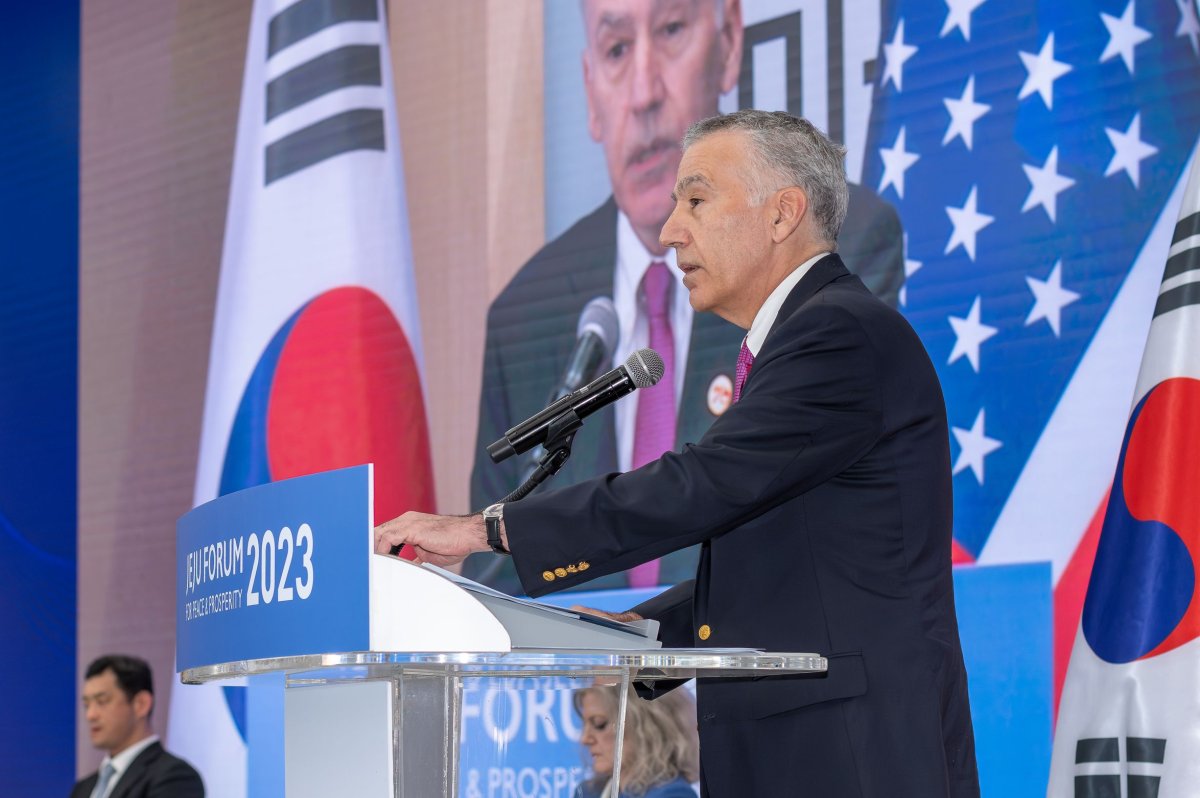U.S. Ambassador to South Korea Philip Goldberg gives the keynote speech during a special session on the 70th anniversary of the South Korea-U.S. alliance at the Jeju Forum for Peace and Prosperity on Thursday in South Korea. Photo by Darryl Coote/UPI
JEJU ISLAND, South Korea, June 7 (UPI) — As the United States and South Korea celebrate their alliance’s 70th anniversary this year, they approach a pivotal juncture as they attempt to deepen ties while navigating an increasingly volatile geopolitical theater.
Experts in U.S.-Korea relations and officials of the two governments were bullish on the prospects and potential of the growing relationship during the recent Jeju Forum for Peace and Prosperity in a special session dedicated to examining the past, present and future of the alliance.
They described it as a stalwart pillar to uphold peace, prosperity and security, not only on the Korean Peninsula, but in Asia and the wider world.
U.S. Ambassador to South Korea Philip Goldberg, who gave the keynote speech during the panel held Thursday on South Korea’s southernmost resort island of Jeju, said Seoul and Washington are “natural partners because our alliance is based on shared values” and a shared vision of a world governed by democratic norms, human rights and the rule of law.
“Together, the United States and Korea have molded a present where we are partners for good, where we combine our strengths to create innovative solutions and secure our mutual prosperity,” he said, adding that the alliance is agile and has adapted to changing landscapes while incorporating “every aspect of global security, sustainable development and technological advancement and economic stability.”
He also credited the alliance for providing South Korea with the security umbrella that allowed it to progress into a technological and scientific superpower that is exporting its culture around the world.
Japan relations
The session was held as South Korea under the Yoon Suk-yeol administration has taken bold steps to thaw frigid relations with Japan and deepen military ties with the United States that were met with criticism at home.
Patrick Cronin, the Asia-Pacific security chair at the Hudson Institute and a scholar in residence at Carnegie Mellon University, called Yoon’s outreach to Japanese Prime Minister Fumio Kishida to settle historical grievances and restore military ties an act that took “a lot of courage.”
The United States, South Korea and Japan share common values and together can revise “the rules of the road” for issues spanning from war to technology and economic policy, he said.
“That’s what this new global strategic alliance can do.”
Cronin proposed the trio could be a second pillar to Australia, Britain and the United States’ AUKUS group, which signed an agreement in March to build a fleet of nuclear-powered submarines to counter Chinese aggression in the Pacific.
South Korea, with its technological knowhow, could also contribute to the Quadrilateral Security Dialogue of Australia, India, Japan and the United States, as well as to the Group of 7 and NATO.
“All of those issues are things that Korea needs to be contributing to, providing those global public goods,” he said. “We need Korea to be part of the solution to the policy crisis.”
U.S. relations
The fostering of relations with Japan is evidence of South Korea’s further stretching out into the International community, and Cronin described the U.S.-South Korea alliance as a lynchpin of freedom, prosperity and security that should be extended beyond the Korean Peninsula.
However, the relationship between the United States and South Korea is on the verge of evolution in the wake of Yoon and U.S. President Joe Biden issuing the so-called Washington Declaration in April during the South Korean president’s visit to the White House.
The panelists discussed the declaration as a reaffirmation of joint values and a recommitment of the United States to protect the Korean people from any North Korean nuclear attack.
The declaration established the Nuclear Consultative Group, which aims to extend deterrence and manage the threat posed by the North’s Kim Jong Un regime.
While some may view it as South Korea dismissing its own nuclear sovereignty, since the declaration states Seoul reaffirms its commitment to the Nuclear Nonproliferation Treaty, Cronin argued that what Yoon negotiated in return was a greater say in the potential use of the U.S. weapons arsenal.
“Yes, the finger on the button remains in Washington, but the voice is in the ear of Washington every second of every day,” he said.
He also added that Yoon avoided having to incur the costs to build nuclear weapons while having access to the United States, which “we couldn’t build again if we had to start from scratch.”
Allison Hooker, senior vice president at American Global Strategies with more than 20 years’ government experience in Asia, said the alliance should extend farther than the peninsula and beyond just confronting the North Korean challenge.
Last year’s global comprehensive strategic alliance agreement between Yoon and Biden not only deals with peace, but calls for the deepening of economic and technology partnerships between the two nations, including sectors from electric vehicle batteries to quantum technology and artificial intelligence.
“Our countries have a great record on innovation and we should be working together to make advancements in these fields and we are, and I believe this is the future of the alliances, as well,” she said.
The work conducted together will have a positive impact on the global supply chain by making it more resilient and on economic security and prosperity, she said.
“During my time in government, we always wanted to be able to say [the alliance] is the strongest it’s ever been, and I really think we can say that now,” she said.



